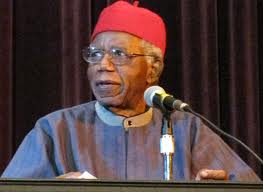Africa’s Literally legend, Chinua Achebe is dead. Prof. Achebe, 83, died on Thursday at a Boston hospital in the United States where he has been undergoing treatment.
Achebe known across the globe for his ground breaking novels like Things Fall Apart, A man of the People, Arrow of God, No Longer at Ease, Antihills of Savanah, among others has been a David and Marianna Fisher University Professor and Professor of Africana Studies at Brown University.
 The University describes the Nigerian Achebe as “known the world over for having played a seminal role in the founding and development of African literature.”
The University describes the Nigerian Achebe as “known the world over for having played a seminal role in the founding and development of African literature.”
“Achebe’s global significance lies not only in his talent and recognition as a writer, but also as a critical thinker and essayist who has written extensively on questions of the role of culture in Africa and the social and political significance of aesthetics and analysis of the postcolonial state in Africa,” Brown University wrote about Achebe.
Prof Achebe was born in Ogidi, Anambra State in 1930 and attended St Philips’ Central School at the age of six. According to an official autobiography, he moved away from his family to Nekede, four kilometres from Owerri, the capital of Imo State at the age of 12 and registered at the Central School there.
Achebe attended Government College Umuahia for his secondary school education. He was a pioneer student of the University College, now University of Ibadan in 1948. He was first admitted to study medicine but changed to English, history and theology after his first year.
While studying at Ibadan, Achebe began to become critical of European literature about Africa. He eventually wrote his final papers in the University in 1953 and emerged with a second-class degree.
Prof Achebe taught for a while after graduation before joining the Nigeria Broadcast Service in 1954 in Lagos.
While in Lagos with the Broadcast Service, Achebe met Christie Okoli, who later became his wife; they got married in 1961. The couple had four children.
He also played a major role during the Nigeria Civil War where he joined the Biafran Government as an ambassador.
His latest book, There Was a Country, was an autobiography on his experiences and views of the civil war. The latest book was probably the most criticised of his writings especially by Nigerians, with many arguing that the professor did not write a balanced account and wrote more as a Biafran than as a Nigerian.
Mr. Achebe was a regular critic of various military dictators that ruled Nigeria and loud voice in denouncing the failure of governance in the country.
He twice rejected offers by the Nigerian government to grant him a national honour citing the deplorable political situations in the country, particularly in his home state, Anambra, as reason.
Here is how the university profiled him on its website.




















